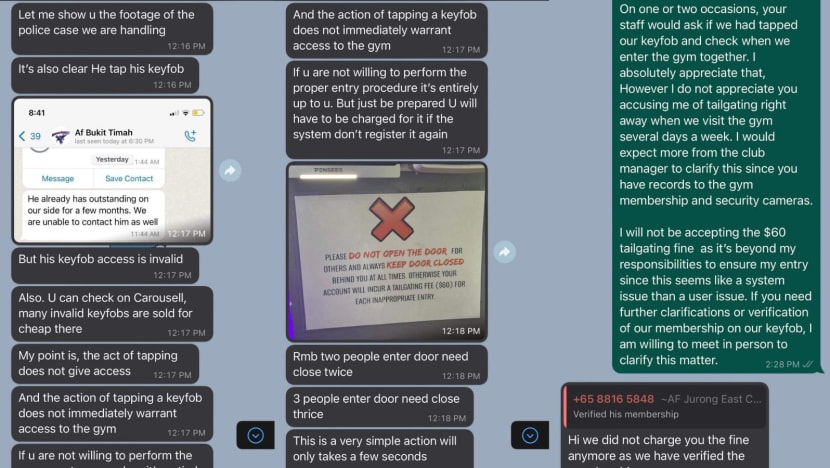Anytime Fitness tailgating fee: Can businesses legally enforce such fines?
Two weeks ago, gym chain Anytime Fitness apologised for charging its Bugis outlet member S$60 as a "tailgating fee". CNA speaks to another member who was also asked to pay a fine and asks lawyers if these terms are enforceable.

CCTV screenshots of Anytime Fitness members who were accused of allowing someone else to tailgate at the Bugis and Jurong East Central outlets.
SINGAPORE: Terms and conditions that restrict customers from allowing others to enter a business's premises without permission are legally enforceable in general, but they should not exist purely to protect one party or be unfair to customers, lawyers told CNA.
In the case of tailgating fees levied by 24-hour gym chain Anytime Fitness in Singapore, their terms and conditions do not appear to put the onus on members to stop others from tailgating, the lawyers added.
The issue made headlines last week when a member of Anytime Fitness’ Bugis outlet took to social media to dispute a S$60 (US$45) tailgating fee.
An unidentified woman had followed him into the gym without using her key fob, but the member said he did not notice her.
The outlet’s management subsequently apologised for what it described as a “mistake” by staff, who had told him to pay the fee if he could not verify that the woman was a fellow member.
On TikTok, the man – named Alan – shared screenshots of the gym’s terms and conditions. He said they did not mention anything about tailgating.
One of the terms stated that members must not allow anyone else to use their key fob, and must raise an alert immediately if it is lost or stolen. If a member violates this policy, they could be charged a guest fee and have their membership suspended or cancelled, subject to a cancellation fee.
Alan questioned if this policy applied to him, given that he did not allow the woman to use his key fob.
GUEST OR TRESPASSER?
While terms and conditions restricting gym members from bringing in guests are legally enforceable in general, the question is whether someone is a guest or an unwelcome trespasser, said Mr Jonathan Tan, senior legal associate of Wither KhattarWong’s dispute resolution team.
If the person has trespassed or is a tailgater unknown to the member, it is difficult to agree that members should have a legal obligation to prevent such people from entering the gym premises, Mr Tan added.
“This is tantamount to expecting gym members to be a security guard for the gym. We also have to consider the safety risk to gym members if they are expected to confront the trespasser or tailgater.”
Mr Mark Teng, executive director of That.Legal LLC, said such contractual terms “should not be drafted just to protect one party” or it will become “a recipe for unhappiness down the road”.
He noted that this will happen when – rather than if – the other party finds out they agreed to something they felt was not right.
Mr Nicolas Tang, managing director of Farallon Law, said the legal enforceability of such terms and conditions also depends on whether they are in the membership contract, or are merely imposed on members after they join the club.
Alan was referred to Anytime Fitness’ membership policies when he disputed his tailgating fee. These terms would not be enforceable against him if he did not sign the policies or they did not form part of the membership contract, Mr Tang added.
NOT MEMBERS' RESPONSIBILITY TO DETER TAILGATING
All three lawyers agreed that under the gym chain’s terms and conditions, it can only justly impose a tailgating fee if Alan intentionally allowed someone to enter using his key fob.
Mr Teng said it appeared that the gym member could legitimately argue that he neither brought the tailgater in nor allowed anyone else to use his key.
“Nowhere in the terms does it say in so many words that it is Alan’s responsibility to ensure that no other person should be permitted to tailgate him. If these terms were provided for, then a ‘tailgating fee’ might then have been justified,” Mr Teng pointed out.
“Perhaps, from a customer relations standpoint, it would have been better if Anytime Fitness had sought Alan’s input first before imposing the ‘tailgating fee’ blindly.
“From a legal agreement drafting perspective, Anytime Fitness could have been more customer-centric with its policies," Mr Teng added.
Mr Tan said the tailgating fee imposed by Anytime Fitness is unlikely to be legally enforceable if it was not stipulated in any relevant contractual documents. Penalty clauses in contracts – which are clauses that disproportionately punish a breach of contract – are generally not enforceable in Singapore either.
He noted that if a court had to rule on this issue, it likely has to consider some factors like whether the relevant terms of the contract are unfair to the gym member – including whether the Unfair Contract Terms Act 1977 applies.
This legislation primarily protects consumers who may suffer prejudice by virtue of their weaker bargaining positions.
A court would also consider whether the gym has a duty or obligation to protect the security or integrity of its premises, like installing a turnstile at the entrance.
"If a gym wants to take a harsh position in relation to trespassers or tailgaters, and yet decides to adopt a certain business model (such as being open 24 hours without any attendants), then it might be reasonable to expect that the gym should take certain precautions to safeguard its own interests and the security of the gym premises and gym members," Mr Tan added.
Another factor for a court to consider is whether such terms have been specifically agreed by or highlighted to the customer or member, Mr Tan said.
He raised the legal principle called the “red hand rule”, which states that an unfair or onerous clause must be brought fairly and reasonably to the attention of the other party before it can be enforced – for example, with a hand symbol printed in red ink pointing to an onerous term.
"A BUNCH OF ACCUSATIONS AND NO APOLOGY"
Alan is not the only Anytime Fitness member in Singapore who has run into issues with tailgating fines. Following his case, CNA spoke to a member from its Jurong East Central outlet who was similarly asked to pay a S$60 tailgating fee.
A search of Google reviews for the outlet revealed similar complaints by other users about such fees.
The 30-year-old, who only wanted to be identified as Ms Ng, said the outlet’s manager accused her of allowing someone else to tailgate in November last year.
Ms Ng told CNA that she had gone to the gym with her husband, who is also a member, but his entry was not recorded for some reason when he tapped his key fob after she did. His actions were clear from the outlet’s CCTV footage, she added.

Ms Ng shared with CNA screenshots of her text message exchange with the outlet manager. In these messages, Ms Ng said the incident had happened when Anytime Fitness staff were around, and they should have been notified immediately when her husband’s entry was not registered.
Anytime Fitness does not have staff at their outlets around the clock due to their 24/7 operations.
However, the manager, who identified herself as Jasmine, told Ms Ng that “the action of tapping a key fob does not immediately warrant access to the gym”, given that invalid key fobs are being sold online.
Jasmine also sent her a photo of a sign at the premises that read “Please do not open the door for others and always keep door closed behind you at all times, otherwise your account will incur a tailgating fee ($60) for each inappropriate entry”.
When Ms Ng further disputed the fee, Jasmine eventually said she would not be charged as the outlet had verified her husband’s membership.
The manager added that going forward, the outlet would charge her the tailgating fee “now that you are fully aware of the door entry procedures”.
Ms Ng told CNA: “There was a bunch of accusations and no apology … Ever since this incident, I stopped going to the Jurong East Central outlet and went to another outlet instead.”

CAN OTHER PLACES IMPOSE TAILGATING FEES?
Other places like condominiums could also fine residents or residents for tailgating but certain conditions should be in place, said Mr Tang from Farallon.
There must be contractual wording that specifies a prohibition on tailgating, and the amount of the fine. More importantly, there must be evidence that the member or resident has expressly agreed to such conditions, the lawyer added.
“We often see cars tailgating other cars when exiting a car park to avoid paying car park fees. Yet, the car park operators like HDB and URA do not fine the (driver of the) car in front because they have no basis to do so. The fine is imposed on the tailgater instead,” he said.
For residential properties, Mr Teng from That.Legal said it depends on the condominium's by-laws. These are the agreements between the home owners and the Management Corporation Strata Title, which refers to the managing body of a condominium or development.
However, Mr Tan from Withers KhattarWong noted that a condominium does not have the power to issue fines. He said if its by-laws have similar provisions to those of Anytime Fitness, it is likely that the legality of these by-laws can be challenged.
Apart from this, trespassers or tailgaters at condominiums can be prosecuted for wilful or criminal trespass, he added.
Condominiums also usually have security posts and officers to prevent trespass and tailgating, so it would be "strange" for their by-laws to expect residents to stop this from happening, said Mr Tan.
He cautioned that while businesses need protective clauses to insure themselves against risk and damage, going too far “may prove futile” if said clauses are ruled to be legally invalid or unenforceable.
He added: “Businesses will need to strike a balance between protecting themselves, protecting the rights of their customers, and increasingly, their reputation and integrity in the eyes of the public.”
















